Dissertation: Travel Agency Services and the Young Customer Segment
VerifiedAdded on 2023/06/07
|68
|22688
|349
Thesis and Dissertation
AI Summary
This dissertation investigates factors influencing travel planning among young people and aims to help travel agencies improve their services. It emphasizes the importance of the internet in travel planning and uses a survey method to gather data on travel habits, booking preferences, and personal information from young respondents. The study includes a theoretical framework defining key terms like tourism, travel agent, and online bookings. Data analysis reveals insights into the profile of the Y generation traveler and offers key findings to assist travel agencies in effectively targeting this demographic, with the ultimate goal of enhancing customer engagement and business success. Desklib provides access to this dissertation along with a wealth of study resources for students.
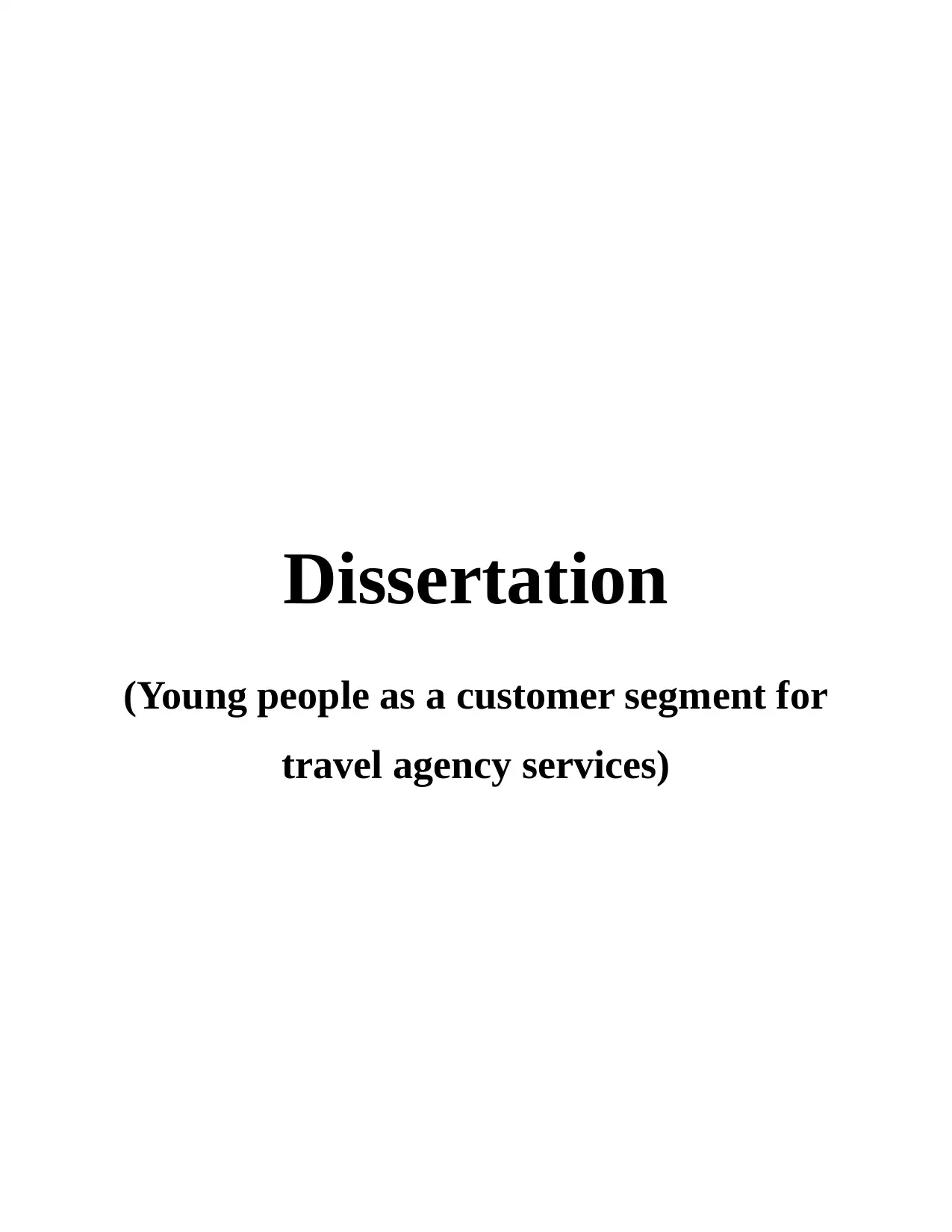
Dissertation
(Young people as a customer segment for
travel agency services)
(Young people as a customer segment for
travel agency services)
Paraphrase This Document
Need a fresh take? Get an instant paraphrase of this document with our AI Paraphraser
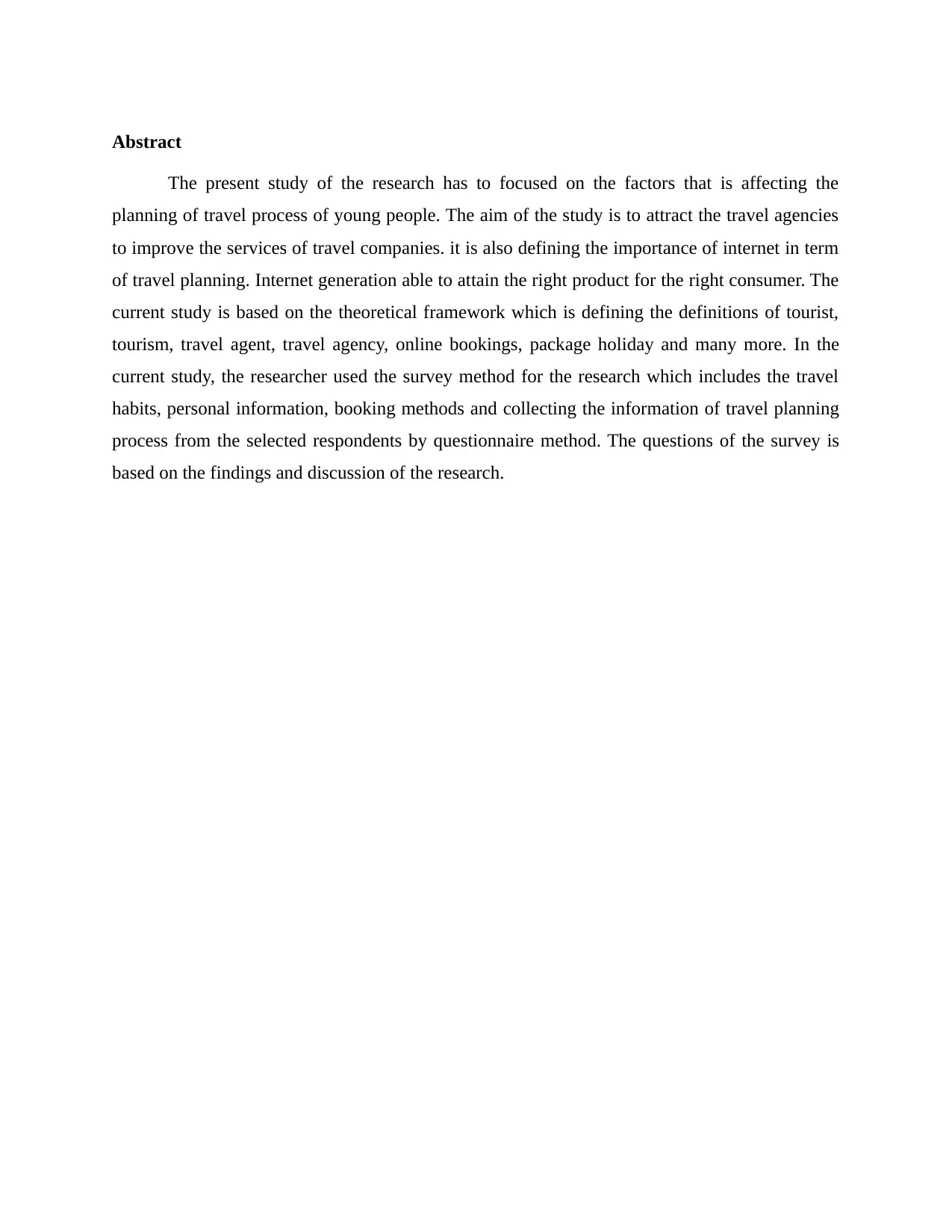
Abstract
The present study of the research has to focused on the factors that is affecting the
planning of travel process of young people. The aim of the study is to attract the travel agencies
to improve the services of travel companies. it is also defining the importance of internet in term
of travel planning. Internet generation able to attain the right product for the right consumer. The
current study is based on the theoretical framework which is defining the definitions of tourist,
tourism, travel agent, travel agency, online bookings, package holiday and many more. In the
current study, the researcher used the survey method for the research which includes the travel
habits, personal information, booking methods and collecting the information of travel planning
process from the selected respondents by questionnaire method. The questions of the survey is
based on the findings and discussion of the research.
The present study of the research has to focused on the factors that is affecting the
planning of travel process of young people. The aim of the study is to attract the travel agencies
to improve the services of travel companies. it is also defining the importance of internet in term
of travel planning. Internet generation able to attain the right product for the right consumer. The
current study is based on the theoretical framework which is defining the definitions of tourist,
tourism, travel agent, travel agency, online bookings, package holiday and many more. In the
current study, the researcher used the survey method for the research which includes the travel
habits, personal information, booking methods and collecting the information of travel planning
process from the selected respondents by questionnaire method. The questions of the survey is
based on the findings and discussion of the research.
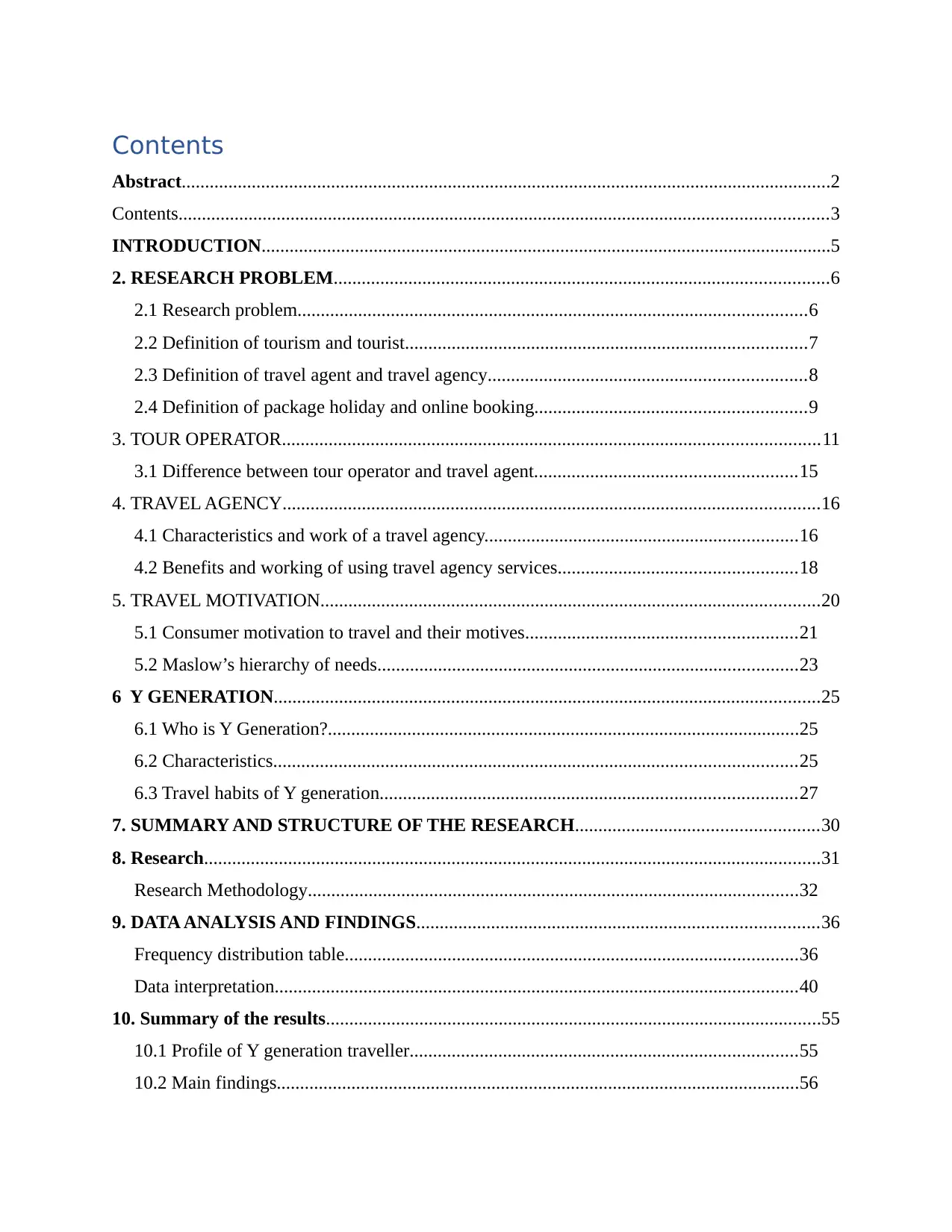
Contents
Abstract...........................................................................................................................................2
Contents...........................................................................................................................................3
INTRODUCTION..........................................................................................................................5
2. RESEARCH PROBLEM..........................................................................................................6
2.1 Research problem.............................................................................................................6
2.2 Definition of tourism and tourist......................................................................................7
2.3 Definition of travel agent and travel agency....................................................................8
2.4 Definition of package holiday and online booking..........................................................9
3. TOUR OPERATOR...................................................................................................................11
3.1 Difference between tour operator and travel agent........................................................15
4. TRAVEL AGENCY...................................................................................................................16
4.1 Characteristics and work of a travel agency...................................................................16
4.2 Benefits and working of using travel agency services...................................................18
5. TRAVEL MOTIVATION...........................................................................................................20
5.1 Consumer motivation to travel and their motives..........................................................21
5.2 Maslow’s hierarchy of needs..........................................................................................23
6 Y GENERATION.....................................................................................................................25
6.1 Who is Y Generation?.....................................................................................................25
6.2 Characteristics................................................................................................................25
6.3 Travel habits of Y generation.........................................................................................27
7. SUMMARY AND STRUCTURE OF THE RESEARCH....................................................30
8. Research....................................................................................................................................31
Research Methodology.........................................................................................................32
9. DATA ANALYSIS AND FINDINGS......................................................................................36
Frequency distribution table.................................................................................................36
Data interpretation................................................................................................................40
10. Summary of the results..........................................................................................................55
10.1 Profile of Y generation traveller...................................................................................55
10.2 Main findings................................................................................................................56
Abstract...........................................................................................................................................2
Contents...........................................................................................................................................3
INTRODUCTION..........................................................................................................................5
2. RESEARCH PROBLEM..........................................................................................................6
2.1 Research problem.............................................................................................................6
2.2 Definition of tourism and tourist......................................................................................7
2.3 Definition of travel agent and travel agency....................................................................8
2.4 Definition of package holiday and online booking..........................................................9
3. TOUR OPERATOR...................................................................................................................11
3.1 Difference between tour operator and travel agent........................................................15
4. TRAVEL AGENCY...................................................................................................................16
4.1 Characteristics and work of a travel agency...................................................................16
4.2 Benefits and working of using travel agency services...................................................18
5. TRAVEL MOTIVATION...........................................................................................................20
5.1 Consumer motivation to travel and their motives..........................................................21
5.2 Maslow’s hierarchy of needs..........................................................................................23
6 Y GENERATION.....................................................................................................................25
6.1 Who is Y Generation?.....................................................................................................25
6.2 Characteristics................................................................................................................25
6.3 Travel habits of Y generation.........................................................................................27
7. SUMMARY AND STRUCTURE OF THE RESEARCH....................................................30
8. Research....................................................................................................................................31
Research Methodology.........................................................................................................32
9. DATA ANALYSIS AND FINDINGS......................................................................................36
Frequency distribution table.................................................................................................36
Data interpretation................................................................................................................40
10. Summary of the results..........................................................................................................55
10.1 Profile of Y generation traveller...................................................................................55
10.2 Main findings................................................................................................................56
⊘ This is a preview!⊘
Do you want full access?
Subscribe today to unlock all pages.

Trusted by 1+ million students worldwide
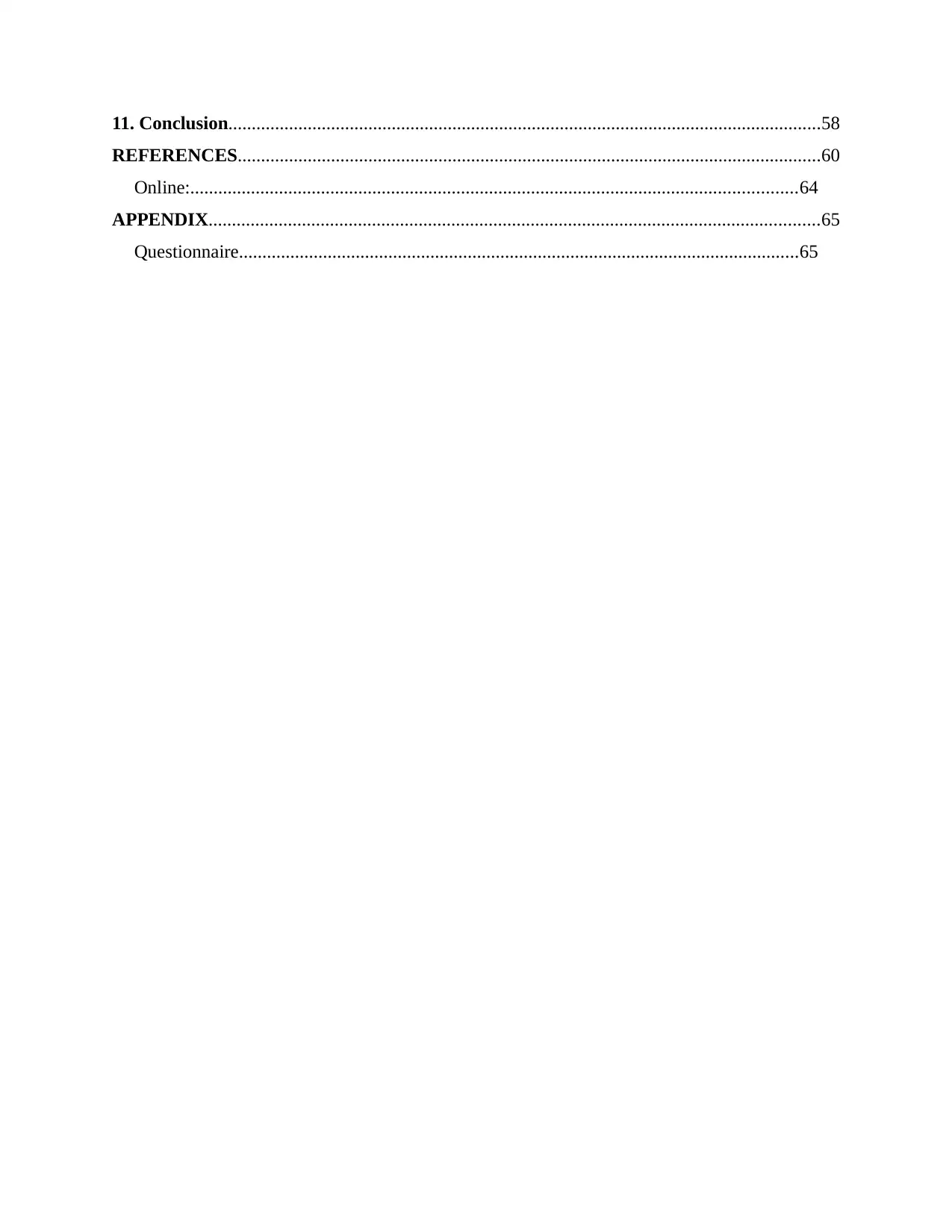
11. Conclusion...............................................................................................................................58
REFERENCES.............................................................................................................................60
Online:..................................................................................................................................64
APPENDIX...................................................................................................................................65
Questionnaire........................................................................................................................65
REFERENCES.............................................................................................................................60
Online:..................................................................................................................................64
APPENDIX...................................................................................................................................65
Questionnaire........................................................................................................................65
Paraphrase This Document
Need a fresh take? Get an instant paraphrase of this document with our AI Paraphraser
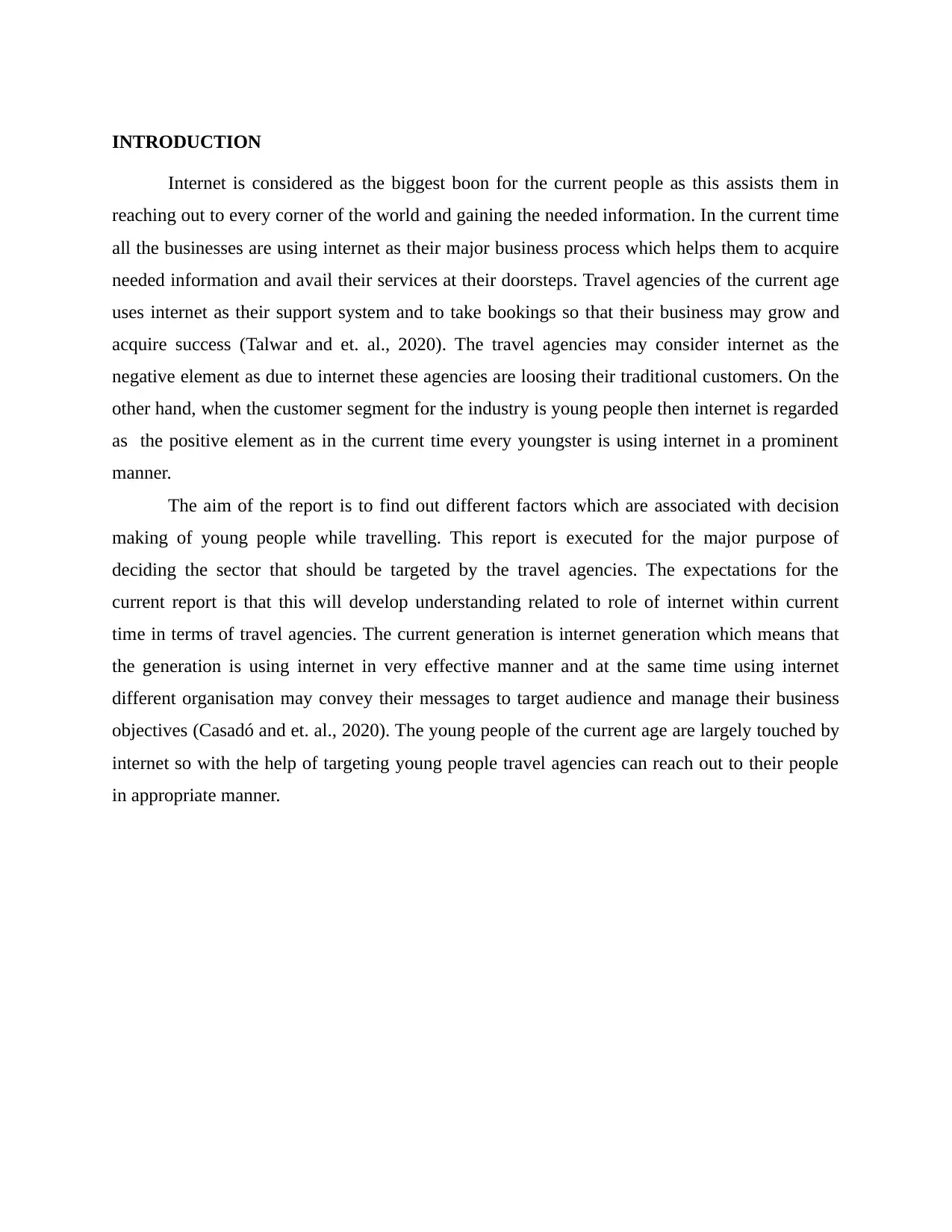
INTRODUCTION
Internet is considered as the biggest boon for the current people as this assists them in
reaching out to every corner of the world and gaining the needed information. In the current time
all the businesses are using internet as their major business process which helps them to acquire
needed information and avail their services at their doorsteps. Travel agencies of the current age
uses internet as their support system and to take bookings so that their business may grow and
acquire success (Talwar and et. al., 2020). The travel agencies may consider internet as the
negative element as due to internet these agencies are loosing their traditional customers. On the
other hand, when the customer segment for the industry is young people then internet is regarded
as the positive element as in the current time every youngster is using internet in a prominent
manner.
The aim of the report is to find out different factors which are associated with decision
making of young people while travelling. This report is executed for the major purpose of
deciding the sector that should be targeted by the travel agencies. The expectations for the
current report is that this will develop understanding related to role of internet within current
time in terms of travel agencies. The current generation is internet generation which means that
the generation is using internet in very effective manner and at the same time using internet
different organisation may convey their messages to target audience and manage their business
objectives (Casadó and et. al., 2020). The young people of the current age are largely touched by
internet so with the help of targeting young people travel agencies can reach out to their people
in appropriate manner.
Internet is considered as the biggest boon for the current people as this assists them in
reaching out to every corner of the world and gaining the needed information. In the current time
all the businesses are using internet as their major business process which helps them to acquire
needed information and avail their services at their doorsteps. Travel agencies of the current age
uses internet as their support system and to take bookings so that their business may grow and
acquire success (Talwar and et. al., 2020). The travel agencies may consider internet as the
negative element as due to internet these agencies are loosing their traditional customers. On the
other hand, when the customer segment for the industry is young people then internet is regarded
as the positive element as in the current time every youngster is using internet in a prominent
manner.
The aim of the report is to find out different factors which are associated with decision
making of young people while travelling. This report is executed for the major purpose of
deciding the sector that should be targeted by the travel agencies. The expectations for the
current report is that this will develop understanding related to role of internet within current
time in terms of travel agencies. The current generation is internet generation which means that
the generation is using internet in very effective manner and at the same time using internet
different organisation may convey their messages to target audience and manage their business
objectives (Casadó and et. al., 2020). The young people of the current age are largely touched by
internet so with the help of targeting young people travel agencies can reach out to their people
in appropriate manner.
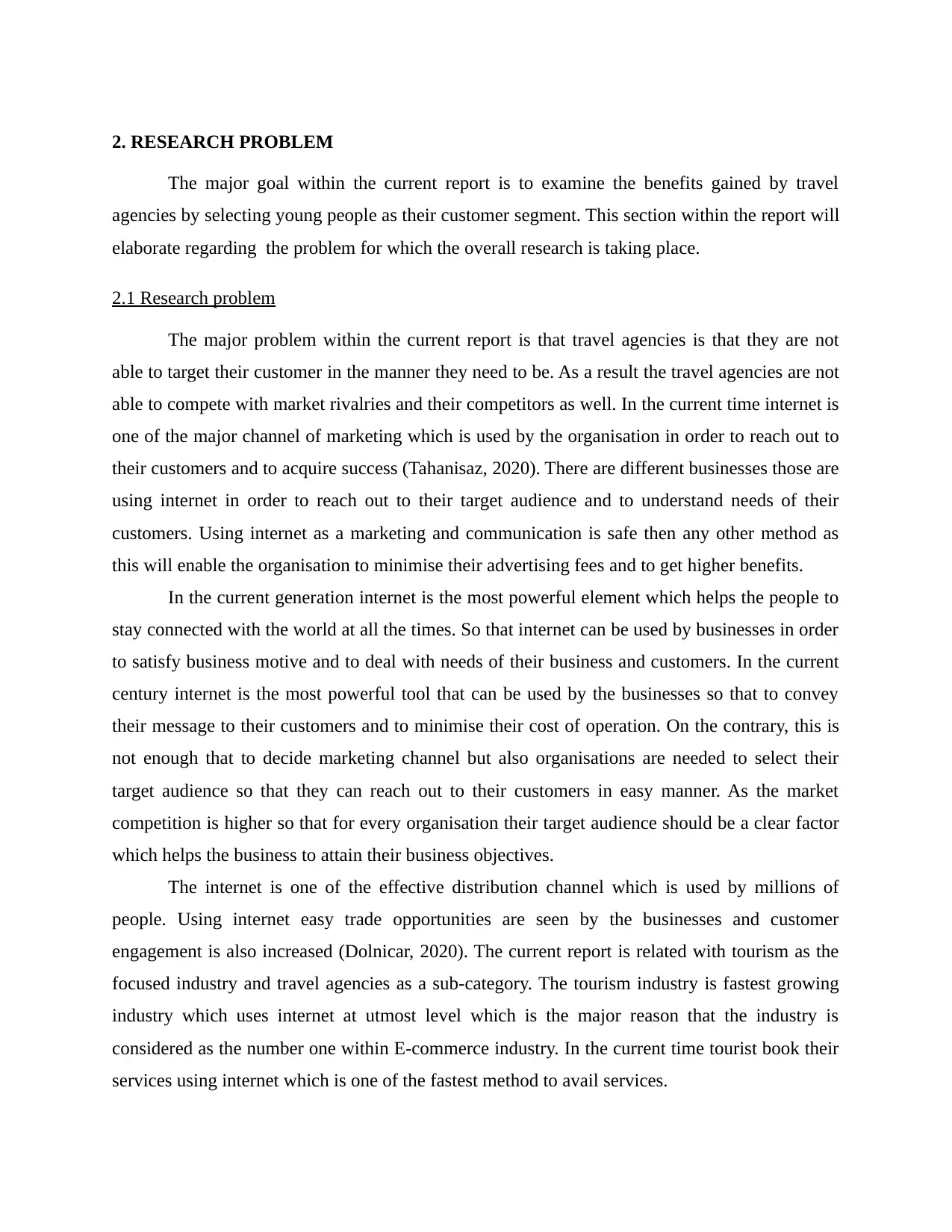
2. RESEARCH PROBLEM
The major goal within the current report is to examine the benefits gained by travel
agencies by selecting young people as their customer segment. This section within the report will
elaborate regarding the problem for which the overall research is taking place.
2.1 Research problem
The major problem within the current report is that travel agencies is that they are not
able to target their customer in the manner they need to be. As a result the travel agencies are not
able to compete with market rivalries and their competitors as well. In the current time internet is
one of the major channel of marketing which is used by the organisation in order to reach out to
their customers and to acquire success (Tahanisaz, 2020). There are different businesses those are
using internet in order to reach out to their target audience and to understand needs of their
customers. Using internet as a marketing and communication is safe then any other method as
this will enable the organisation to minimise their advertising fees and to get higher benefits.
In the current generation internet is the most powerful element which helps the people to
stay connected with the world at all the times. So that internet can be used by businesses in order
to satisfy business motive and to deal with needs of their business and customers. In the current
century internet is the most powerful tool that can be used by the businesses so that to convey
their message to their customers and to minimise their cost of operation. On the contrary, this is
not enough that to decide marketing channel but also organisations are needed to select their
target audience so that they can reach out to their customers in easy manner. As the market
competition is higher so that for every organisation their target audience should be a clear factor
which helps the business to attain their business objectives.
The internet is one of the effective distribution channel which is used by millions of
people. Using internet easy trade opportunities are seen by the businesses and customer
engagement is also increased (Dolnicar, 2020). The current report is related with tourism as the
focused industry and travel agencies as a sub-category. The tourism industry is fastest growing
industry which uses internet at utmost level which is the major reason that the industry is
considered as the number one within E-commerce industry. In the current time tourist book their
services using internet which is one of the fastest method to avail services.
The major goal within the current report is to examine the benefits gained by travel
agencies by selecting young people as their customer segment. This section within the report will
elaborate regarding the problem for which the overall research is taking place.
2.1 Research problem
The major problem within the current report is that travel agencies is that they are not
able to target their customer in the manner they need to be. As a result the travel agencies are not
able to compete with market rivalries and their competitors as well. In the current time internet is
one of the major channel of marketing which is used by the organisation in order to reach out to
their customers and to acquire success (Tahanisaz, 2020). There are different businesses those are
using internet in order to reach out to their target audience and to understand needs of their
customers. Using internet as a marketing and communication is safe then any other method as
this will enable the organisation to minimise their advertising fees and to get higher benefits.
In the current generation internet is the most powerful element which helps the people to
stay connected with the world at all the times. So that internet can be used by businesses in order
to satisfy business motive and to deal with needs of their business and customers. In the current
century internet is the most powerful tool that can be used by the businesses so that to convey
their message to their customers and to minimise their cost of operation. On the contrary, this is
not enough that to decide marketing channel but also organisations are needed to select their
target audience so that they can reach out to their customers in easy manner. As the market
competition is higher so that for every organisation their target audience should be a clear factor
which helps the business to attain their business objectives.
The internet is one of the effective distribution channel which is used by millions of
people. Using internet easy trade opportunities are seen by the businesses and customer
engagement is also increased (Dolnicar, 2020). The current report is related with tourism as the
focused industry and travel agencies as a sub-category. The tourism industry is fastest growing
industry which uses internet at utmost level which is the major reason that the industry is
considered as the number one within E-commerce industry. In the current time tourist book their
services using internet which is one of the fastest method to avail services.
⊘ This is a preview!⊘
Do you want full access?
Subscribe today to unlock all pages.

Trusted by 1+ million students worldwide
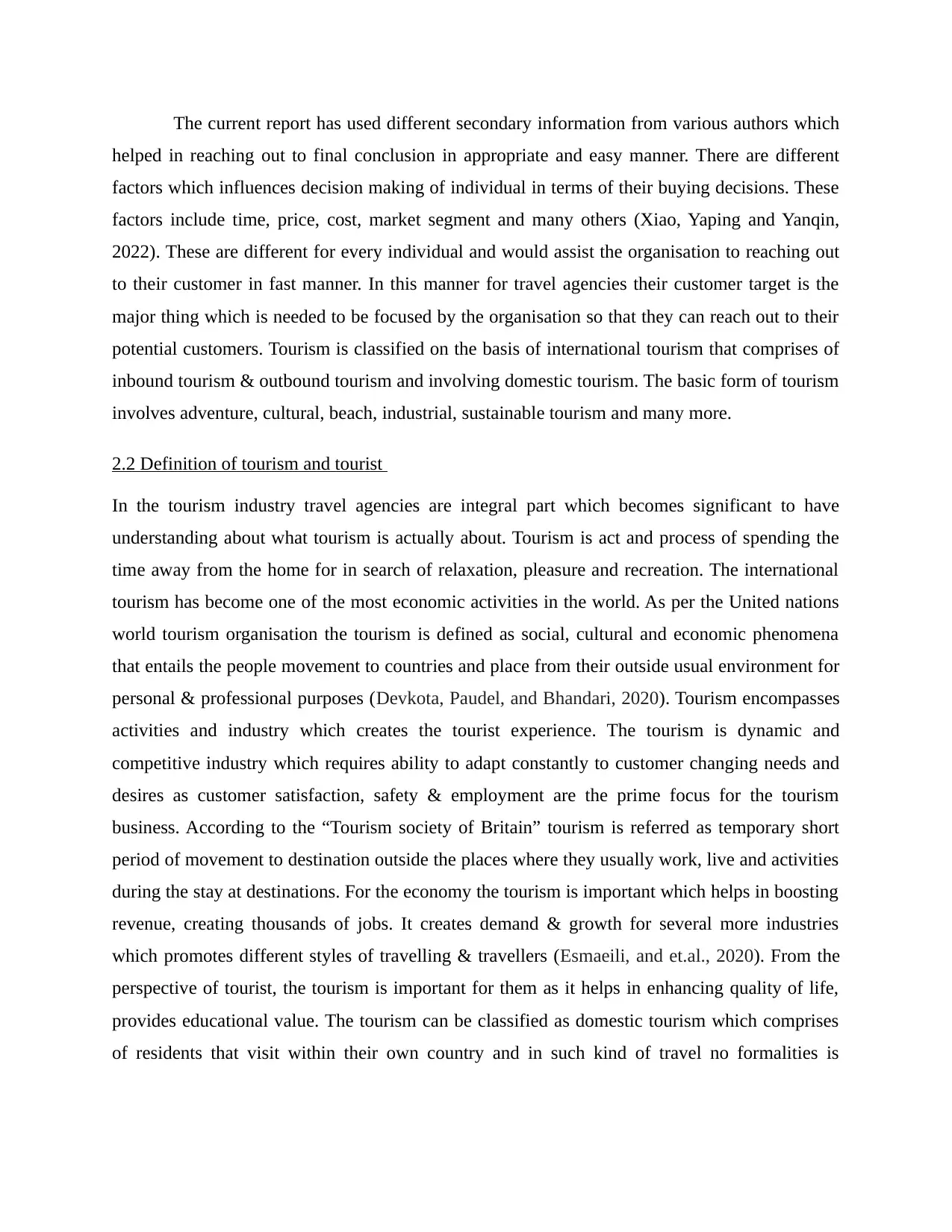
The current report has used different secondary information from various authors which
helped in reaching out to final conclusion in appropriate and easy manner. There are different
factors which influences decision making of individual in terms of their buying decisions. These
factors include time, price, cost, market segment and many others (Xiao, Yaping and Yanqin,
2022). These are different for every individual and would assist the organisation to reaching out
to their customer in fast manner. In this manner for travel agencies their customer target is the
major thing which is needed to be focused by the organisation so that they can reach out to their
potential customers. Tourism is classified on the basis of international tourism that comprises of
inbound tourism & outbound tourism and involving domestic tourism. The basic form of tourism
involves adventure, cultural, beach, industrial, sustainable tourism and many more.
2.2 Definition of tourism and tourist
In the tourism industry travel agencies are integral part which becomes significant to have
understanding about what tourism is actually about. Tourism is act and process of spending the
time away from the home for in search of relaxation, pleasure and recreation. The international
tourism has become one of the most economic activities in the world. As per the United nations
world tourism organisation the tourism is defined as social, cultural and economic phenomena
that entails the people movement to countries and place from their outside usual environment for
personal & professional purposes (Devkota, Paudel, and Bhandari, 2020). Tourism encompasses
activities and industry which creates the tourist experience. The tourism is dynamic and
competitive industry which requires ability to adapt constantly to customer changing needs and
desires as customer satisfaction, safety & employment are the prime focus for the tourism
business. According to the “Tourism society of Britain” tourism is referred as temporary short
period of movement to destination outside the places where they usually work, live and activities
during the stay at destinations. For the economy the tourism is important which helps in boosting
revenue, creating thousands of jobs. It creates demand & growth for several more industries
which promotes different styles of travelling & travellers (Esmaeili, and et.al., 2020). From the
perspective of tourist, the tourism is important for them as it helps in enhancing quality of life,
provides educational value. The tourism can be classified as domestic tourism which comprises
of residents that visit within their own country and in such kind of travel no formalities is
helped in reaching out to final conclusion in appropriate and easy manner. There are different
factors which influences decision making of individual in terms of their buying decisions. These
factors include time, price, cost, market segment and many others (Xiao, Yaping and Yanqin,
2022). These are different for every individual and would assist the organisation to reaching out
to their customer in fast manner. In this manner for travel agencies their customer target is the
major thing which is needed to be focused by the organisation so that they can reach out to their
potential customers. Tourism is classified on the basis of international tourism that comprises of
inbound tourism & outbound tourism and involving domestic tourism. The basic form of tourism
involves adventure, cultural, beach, industrial, sustainable tourism and many more.
2.2 Definition of tourism and tourist
In the tourism industry travel agencies are integral part which becomes significant to have
understanding about what tourism is actually about. Tourism is act and process of spending the
time away from the home for in search of relaxation, pleasure and recreation. The international
tourism has become one of the most economic activities in the world. As per the United nations
world tourism organisation the tourism is defined as social, cultural and economic phenomena
that entails the people movement to countries and place from their outside usual environment for
personal & professional purposes (Devkota, Paudel, and Bhandari, 2020). Tourism encompasses
activities and industry which creates the tourist experience. The tourism is dynamic and
competitive industry which requires ability to adapt constantly to customer changing needs and
desires as customer satisfaction, safety & employment are the prime focus for the tourism
business. According to the “Tourism society of Britain” tourism is referred as temporary short
period of movement to destination outside the places where they usually work, live and activities
during the stay at destinations. For the economy the tourism is important which helps in boosting
revenue, creating thousands of jobs. It creates demand & growth for several more industries
which promotes different styles of travelling & travellers (Esmaeili, and et.al., 2020). From the
perspective of tourist, the tourism is important for them as it helps in enhancing quality of life,
provides educational value. The tourism can be classified as domestic tourism which comprises
of residents that visit within their own country and in such kind of travel no formalities is
Paraphrase This Document
Need a fresh take? Get an instant paraphrase of this document with our AI Paraphraser
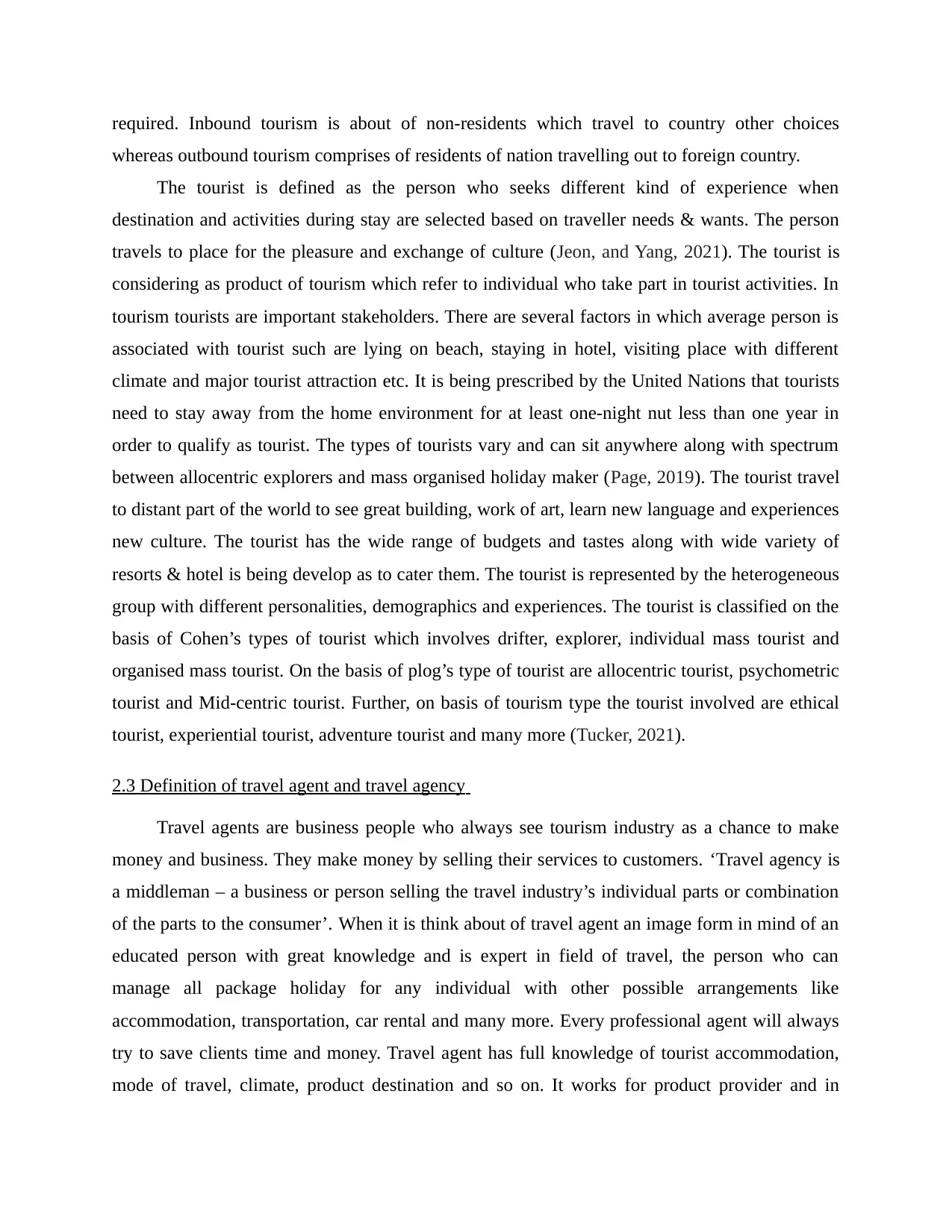
required. Inbound tourism is about of non-residents which travel to country other choices
whereas outbound tourism comprises of residents of nation travelling out to foreign country.
The tourist is defined as the person who seeks different kind of experience when
destination and activities during stay are selected based on traveller needs & wants. The person
travels to place for the pleasure and exchange of culture (Jeon, and Yang, 2021). The tourist is
considering as product of tourism which refer to individual who take part in tourist activities. In
tourism tourists are important stakeholders. There are several factors in which average person is
associated with tourist such are lying on beach, staying in hotel, visiting place with different
climate and major tourist attraction etc. It is being prescribed by the United Nations that tourists
need to stay away from the home environment for at least one-night nut less than one year in
order to qualify as tourist. The types of tourists vary and can sit anywhere along with spectrum
between allocentric explorers and mass organised holiday maker (Page, 2019). The tourist travel
to distant part of the world to see great building, work of art, learn new language and experiences
new culture. The tourist has the wide range of budgets and tastes along with wide variety of
resorts & hotel is being develop as to cater them. The tourist is represented by the heterogeneous
group with different personalities, demographics and experiences. The tourist is classified on the
basis of Cohen’s types of tourist which involves drifter, explorer, individual mass tourist and
organised mass tourist. On the basis of plog’s type of tourist are allocentric tourist, psychometric
tourist and Mid-centric tourist. Further, on basis of tourism type the tourist involved are ethical
tourist, experiential tourist, adventure tourist and many more (Tucker, 2021).
2.3 Definition of travel agent and travel agency
Travel agents are business people who always see tourism industry as a chance to make
money and business. They make money by selling their services to customers. ‘Travel agency is
a middleman – a business or person selling the travel industry’s individual parts or combination
of the parts to the consumer’. When it is think about of travel agent an image form in mind of an
educated person with great knowledge and is expert in field of travel, the person who can
manage all package holiday for any individual with other possible arrangements like
accommodation, transportation, car rental and many more. Every professional agent will always
try to save clients time and money. Travel agent has full knowledge of tourist accommodation,
mode of travel, climate, product destination and so on. It works for product provider and in
whereas outbound tourism comprises of residents of nation travelling out to foreign country.
The tourist is defined as the person who seeks different kind of experience when
destination and activities during stay are selected based on traveller needs & wants. The person
travels to place for the pleasure and exchange of culture (Jeon, and Yang, 2021). The tourist is
considering as product of tourism which refer to individual who take part in tourist activities. In
tourism tourists are important stakeholders. There are several factors in which average person is
associated with tourist such are lying on beach, staying in hotel, visiting place with different
climate and major tourist attraction etc. It is being prescribed by the United Nations that tourists
need to stay away from the home environment for at least one-night nut less than one year in
order to qualify as tourist. The types of tourists vary and can sit anywhere along with spectrum
between allocentric explorers and mass organised holiday maker (Page, 2019). The tourist travel
to distant part of the world to see great building, work of art, learn new language and experiences
new culture. The tourist has the wide range of budgets and tastes along with wide variety of
resorts & hotel is being develop as to cater them. The tourist is represented by the heterogeneous
group with different personalities, demographics and experiences. The tourist is classified on the
basis of Cohen’s types of tourist which involves drifter, explorer, individual mass tourist and
organised mass tourist. On the basis of plog’s type of tourist are allocentric tourist, psychometric
tourist and Mid-centric tourist. Further, on basis of tourism type the tourist involved are ethical
tourist, experiential tourist, adventure tourist and many more (Tucker, 2021).
2.3 Definition of travel agent and travel agency
Travel agents are business people who always see tourism industry as a chance to make
money and business. They make money by selling their services to customers. ‘Travel agency is
a middleman – a business or person selling the travel industry’s individual parts or combination
of the parts to the consumer’. When it is think about of travel agent an image form in mind of an
educated person with great knowledge and is expert in field of travel, the person who can
manage all package holiday for any individual with other possible arrangements like
accommodation, transportation, car rental and many more. Every professional agent will always
try to save clients time and money. Travel agent has full knowledge of tourist accommodation,
mode of travel, climate, product destination and so on. It works for product provider and in
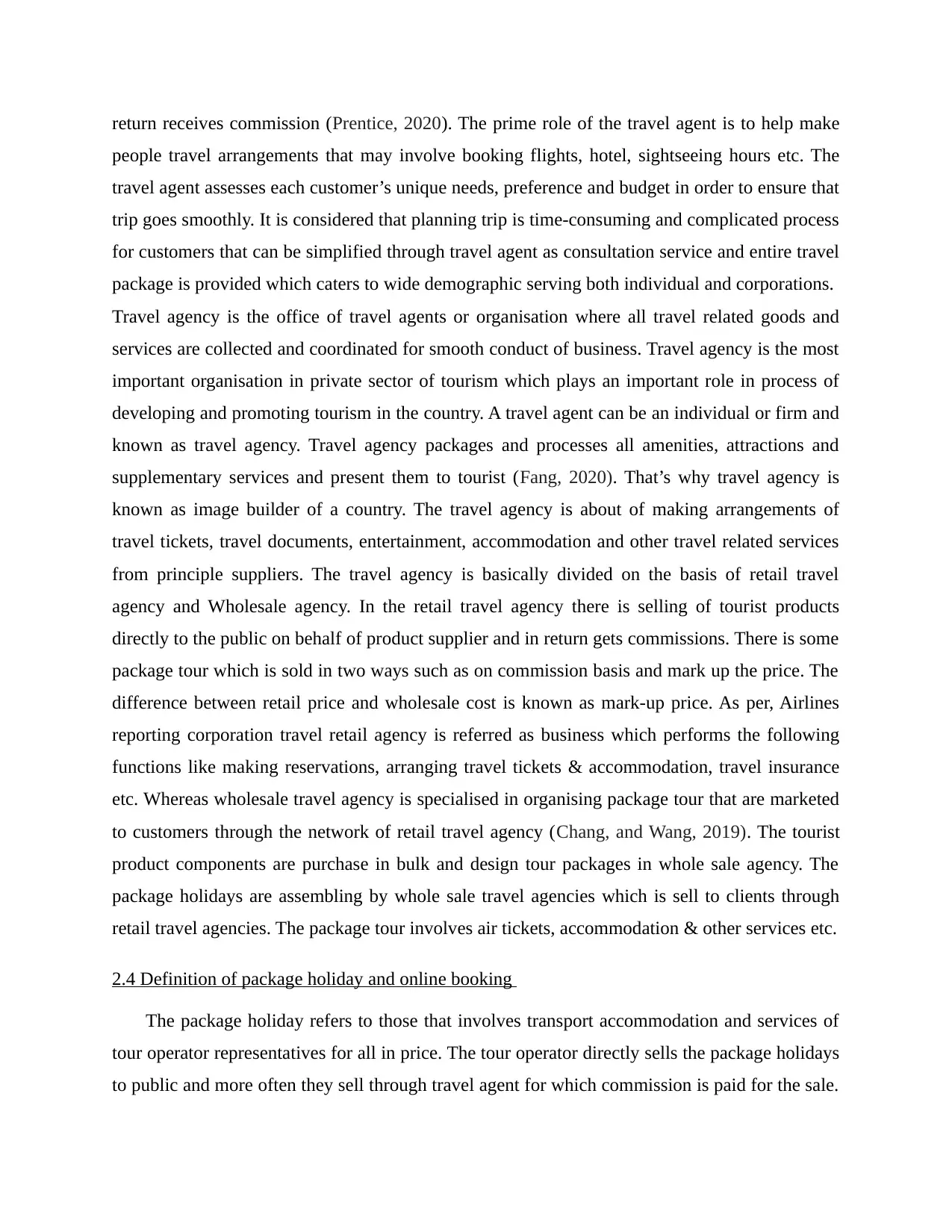
return receives commission (Prentice, 2020). The prime role of the travel agent is to help make
people travel arrangements that may involve booking flights, hotel, sightseeing hours etc. The
travel agent assesses each customer’s unique needs, preference and budget in order to ensure that
trip goes smoothly. It is considered that planning trip is time-consuming and complicated process
for customers that can be simplified through travel agent as consultation service and entire travel
package is provided which caters to wide demographic serving both individual and corporations.
Travel agency is the office of travel agents or organisation where all travel related goods and
services are collected and coordinated for smooth conduct of business. Travel agency is the most
important organisation in private sector of tourism which plays an important role in process of
developing and promoting tourism in the country. A travel agent can be an individual or firm and
known as travel agency. Travel agency packages and processes all amenities, attractions and
supplementary services and present them to tourist (Fang, 2020). That’s why travel agency is
known as image builder of a country. The travel agency is about of making arrangements of
travel tickets, travel documents, entertainment, accommodation and other travel related services
from principle suppliers. The travel agency is basically divided on the basis of retail travel
agency and Wholesale agency. In the retail travel agency there is selling of tourist products
directly to the public on behalf of product supplier and in return gets commissions. There is some
package tour which is sold in two ways such as on commission basis and mark up the price. The
difference between retail price and wholesale cost is known as mark-up price. As per, Airlines
reporting corporation travel retail agency is referred as business which performs the following
functions like making reservations, arranging travel tickets & accommodation, travel insurance
etc. Whereas wholesale travel agency is specialised in organising package tour that are marketed
to customers through the network of retail travel agency (Chang, and Wang, 2019). The tourist
product components are purchase in bulk and design tour packages in whole sale agency. The
package holidays are assembling by whole sale travel agencies which is sell to clients through
retail travel agencies. The package tour involves air tickets, accommodation & other services etc.
2.4 Definition of package holiday and online booking
The package holiday refers to those that involves transport accommodation and services of
tour operator representatives for all in price. The tour operator directly sells the package holidays
to public and more often they sell through travel agent for which commission is paid for the sale.
people travel arrangements that may involve booking flights, hotel, sightseeing hours etc. The
travel agent assesses each customer’s unique needs, preference and budget in order to ensure that
trip goes smoothly. It is considered that planning trip is time-consuming and complicated process
for customers that can be simplified through travel agent as consultation service and entire travel
package is provided which caters to wide demographic serving both individual and corporations.
Travel agency is the office of travel agents or organisation where all travel related goods and
services are collected and coordinated for smooth conduct of business. Travel agency is the most
important organisation in private sector of tourism which plays an important role in process of
developing and promoting tourism in the country. A travel agent can be an individual or firm and
known as travel agency. Travel agency packages and processes all amenities, attractions and
supplementary services and present them to tourist (Fang, 2020). That’s why travel agency is
known as image builder of a country. The travel agency is about of making arrangements of
travel tickets, travel documents, entertainment, accommodation and other travel related services
from principle suppliers. The travel agency is basically divided on the basis of retail travel
agency and Wholesale agency. In the retail travel agency there is selling of tourist products
directly to the public on behalf of product supplier and in return gets commissions. There is some
package tour which is sold in two ways such as on commission basis and mark up the price. The
difference between retail price and wholesale cost is known as mark-up price. As per, Airlines
reporting corporation travel retail agency is referred as business which performs the following
functions like making reservations, arranging travel tickets & accommodation, travel insurance
etc. Whereas wholesale travel agency is specialised in organising package tour that are marketed
to customers through the network of retail travel agency (Chang, and Wang, 2019). The tourist
product components are purchase in bulk and design tour packages in whole sale agency. The
package holidays are assembling by whole sale travel agencies which is sell to clients through
retail travel agencies. The package tour involves air tickets, accommodation & other services etc.
2.4 Definition of package holiday and online booking
The package holiday refers to those that involves transport accommodation and services of
tour operator representatives for all in price. The tour operator directly sells the package holidays
to public and more often they sell through travel agent for which commission is paid for the sale.
⊘ This is a preview!⊘
Do you want full access?
Subscribe today to unlock all pages.

Trusted by 1+ million students worldwide
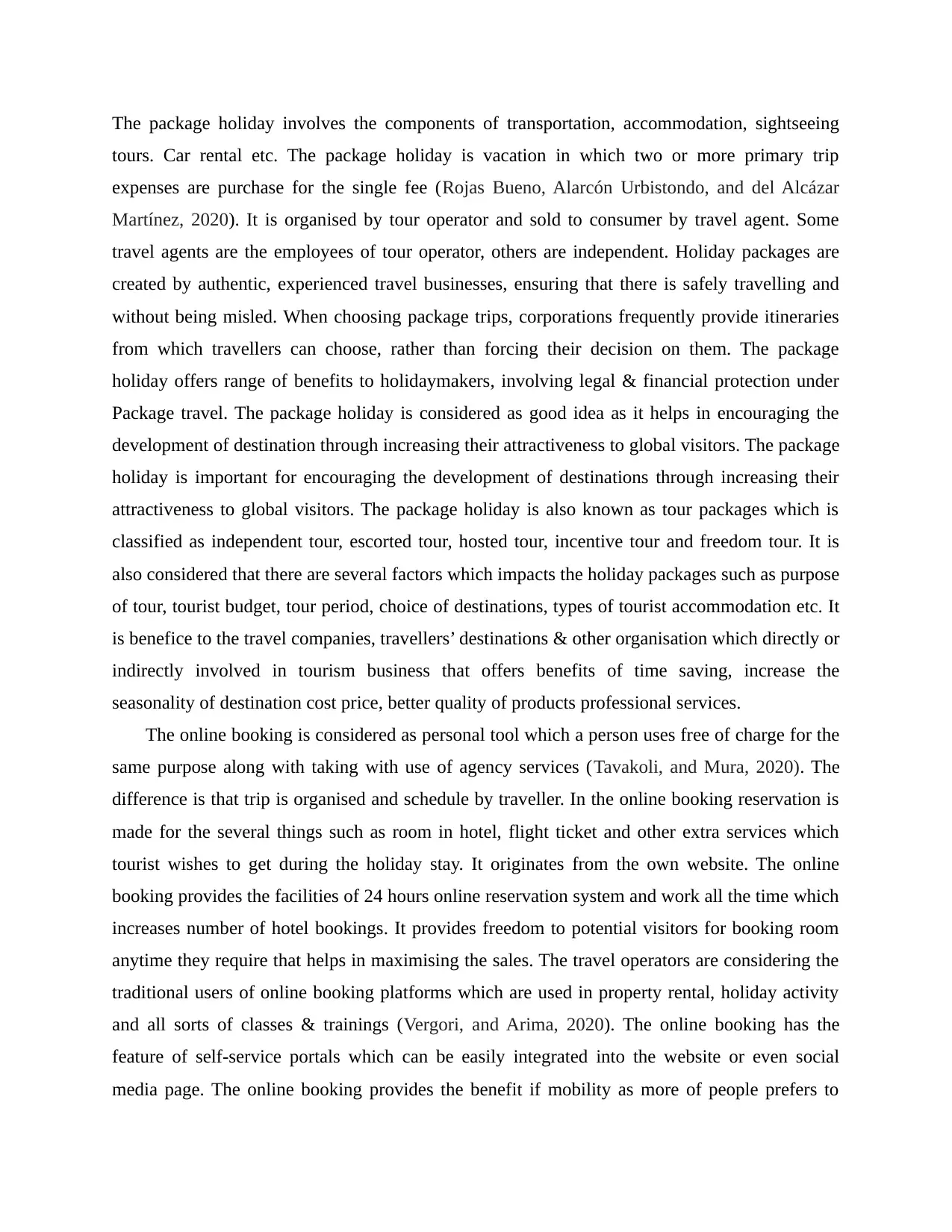
The package holiday involves the components of transportation, accommodation, sightseeing
tours. Car rental etc. The package holiday is vacation in which two or more primary trip
expenses are purchase for the single fee (Rojas Bueno, Alarcón Urbistondo, and del Alcázar
Martínez, 2020). It is organised by tour operator and sold to consumer by travel agent. Some
travel agents are the employees of tour operator, others are independent. Holiday packages are
created by authentic, experienced travel businesses, ensuring that there is safely travelling and
without being misled. When choosing package trips, corporations frequently provide itineraries
from which travellers can choose, rather than forcing their decision on them. The package
holiday offers range of benefits to holidaymakers, involving legal & financial protection under
Package travel. The package holiday is considered as good idea as it helps in encouraging the
development of destination through increasing their attractiveness to global visitors. The package
holiday is important for encouraging the development of destinations through increasing their
attractiveness to global visitors. The package holiday is also known as tour packages which is
classified as independent tour, escorted tour, hosted tour, incentive tour and freedom tour. It is
also considered that there are several factors which impacts the holiday packages such as purpose
of tour, tourist budget, tour period, choice of destinations, types of tourist accommodation etc. It
is benefice to the travel companies, travellers’ destinations & other organisation which directly or
indirectly involved in tourism business that offers benefits of time saving, increase the
seasonality of destination cost price, better quality of products professional services.
The online booking is considered as personal tool which a person uses free of charge for the
same purpose along with taking with use of agency services (Tavakoli, and Mura, 2020). The
difference is that trip is organised and schedule by traveller. In the online booking reservation is
made for the several things such as room in hotel, flight ticket and other extra services which
tourist wishes to get during the holiday stay. It originates from the own website. The online
booking provides the facilities of 24 hours online reservation system and work all the time which
increases number of hotel bookings. It provides freedom to potential visitors for booking room
anytime they require that helps in maximising the sales. The travel operators are considering the
traditional users of online booking platforms which are used in property rental, holiday activity
and all sorts of classes & trainings (Vergori, and Arima, 2020). The online booking has the
feature of self-service portals which can be easily integrated into the website or even social
media page. The online booking provides the benefit if mobility as more of people prefers to
tours. Car rental etc. The package holiday is vacation in which two or more primary trip
expenses are purchase for the single fee (Rojas Bueno, Alarcón Urbistondo, and del Alcázar
Martínez, 2020). It is organised by tour operator and sold to consumer by travel agent. Some
travel agents are the employees of tour operator, others are independent. Holiday packages are
created by authentic, experienced travel businesses, ensuring that there is safely travelling and
without being misled. When choosing package trips, corporations frequently provide itineraries
from which travellers can choose, rather than forcing their decision on them. The package
holiday offers range of benefits to holidaymakers, involving legal & financial protection under
Package travel. The package holiday is considered as good idea as it helps in encouraging the
development of destination through increasing their attractiveness to global visitors. The package
holiday is important for encouraging the development of destinations through increasing their
attractiveness to global visitors. The package holiday is also known as tour packages which is
classified as independent tour, escorted tour, hosted tour, incentive tour and freedom tour. It is
also considered that there are several factors which impacts the holiday packages such as purpose
of tour, tourist budget, tour period, choice of destinations, types of tourist accommodation etc. It
is benefice to the travel companies, travellers’ destinations & other organisation which directly or
indirectly involved in tourism business that offers benefits of time saving, increase the
seasonality of destination cost price, better quality of products professional services.
The online booking is considered as personal tool which a person uses free of charge for the
same purpose along with taking with use of agency services (Tavakoli, and Mura, 2020). The
difference is that trip is organised and schedule by traveller. In the online booking reservation is
made for the several things such as room in hotel, flight ticket and other extra services which
tourist wishes to get during the holiday stay. It originates from the own website. The online
booking provides the facilities of 24 hours online reservation system and work all the time which
increases number of hotel bookings. It provides freedom to potential visitors for booking room
anytime they require that helps in maximising the sales. The travel operators are considering the
traditional users of online booking platforms which are used in property rental, holiday activity
and all sorts of classes & trainings (Vergori, and Arima, 2020). The online booking has the
feature of self-service portals which can be easily integrated into the website or even social
media page. The online booking provides the benefit if mobility as more of people prefers to
Paraphrase This Document
Need a fresh take? Get an instant paraphrase of this document with our AI Paraphraser
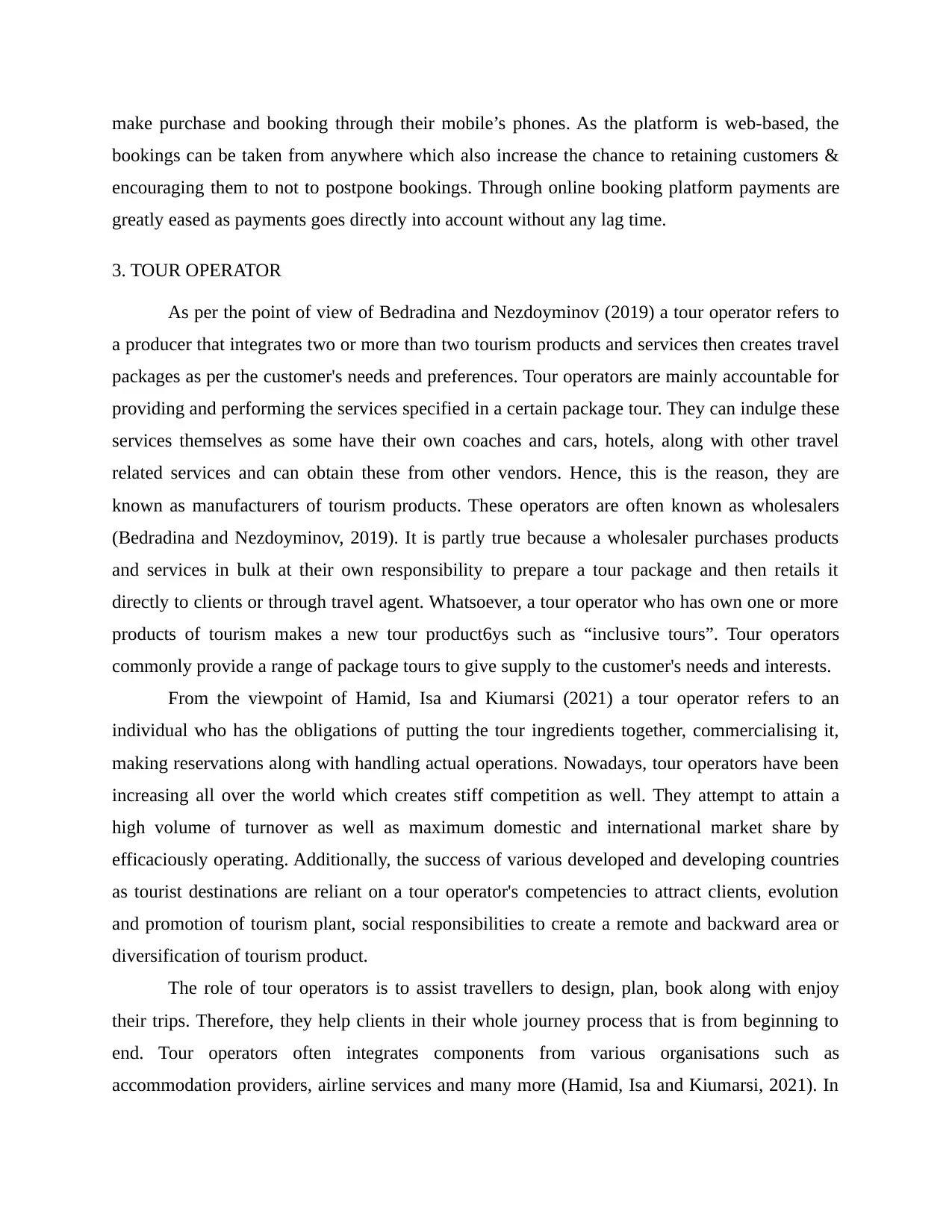
make purchase and booking through their mobile’s phones. As the platform is web-based, the
bookings can be taken from anywhere which also increase the chance to retaining customers &
encouraging them to not to postpone bookings. Through online booking platform payments are
greatly eased as payments goes directly into account without any lag time.
3. TOUR OPERATOR
As per the point of view of Bedradina and Nezdoyminov (2019) a tour operator refers to
a producer that integrates two or more than two tourism products and services then creates travel
packages as per the customer's needs and preferences. Tour operators are mainly accountable for
providing and performing the services specified in a certain package tour. They can indulge these
services themselves as some have their own coaches and cars, hotels, along with other travel
related services and can obtain these from other vendors. Hence, this is the reason, they are
known as manufacturers of tourism products. These operators are often known as wholesalers
(Bedradina and Nezdoyminov, 2019). It is partly true because a wholesaler purchases products
and services in bulk at their own responsibility to prepare a tour package and then retails it
directly to clients or through travel agent. Whatsoever, a tour operator who has own one or more
products of tourism makes a new tour product6ys such as “inclusive tours”. Tour operators
commonly provide a range of package tours to give supply to the customer's needs and interests.
From the viewpoint of Hamid, Isa and Kiumarsi (2021) a tour operator refers to an
individual who has the obligations of putting the tour ingredients together, commercialising it,
making reservations along with handling actual operations. Nowadays, tour operators have been
increasing all over the world which creates stiff competition as well. They attempt to attain a
high volume of turnover as well as maximum domestic and international market share by
efficaciously operating. Additionally, the success of various developed and developing countries
as tourist destinations are reliant on a tour operator's competencies to attract clients, evolution
and promotion of tourism plant, social responsibilities to create a remote and backward area or
diversification of tourism product.
The role of tour operators is to assist travellers to design, plan, book along with enjoy
their trips. Therefore, they help clients in their whole journey process that is from beginning to
end. Tour operators often integrates components from various organisations such as
accommodation providers, airline services and many more (Hamid, Isa and Kiumarsi, 2021). In
bookings can be taken from anywhere which also increase the chance to retaining customers &
encouraging them to not to postpone bookings. Through online booking platform payments are
greatly eased as payments goes directly into account without any lag time.
3. TOUR OPERATOR
As per the point of view of Bedradina and Nezdoyminov (2019) a tour operator refers to
a producer that integrates two or more than two tourism products and services then creates travel
packages as per the customer's needs and preferences. Tour operators are mainly accountable for
providing and performing the services specified in a certain package tour. They can indulge these
services themselves as some have their own coaches and cars, hotels, along with other travel
related services and can obtain these from other vendors. Hence, this is the reason, they are
known as manufacturers of tourism products. These operators are often known as wholesalers
(Bedradina and Nezdoyminov, 2019). It is partly true because a wholesaler purchases products
and services in bulk at their own responsibility to prepare a tour package and then retails it
directly to clients or through travel agent. Whatsoever, a tour operator who has own one or more
products of tourism makes a new tour product6ys such as “inclusive tours”. Tour operators
commonly provide a range of package tours to give supply to the customer's needs and interests.
From the viewpoint of Hamid, Isa and Kiumarsi (2021) a tour operator refers to an
individual who has the obligations of putting the tour ingredients together, commercialising it,
making reservations along with handling actual operations. Nowadays, tour operators have been
increasing all over the world which creates stiff competition as well. They attempt to attain a
high volume of turnover as well as maximum domestic and international market share by
efficaciously operating. Additionally, the success of various developed and developing countries
as tourist destinations are reliant on a tour operator's competencies to attract clients, evolution
and promotion of tourism plant, social responsibilities to create a remote and backward area or
diversification of tourism product.
The role of tour operators is to assist travellers to design, plan, book along with enjoy
their trips. Therefore, they help clients in their whole journey process that is from beginning to
end. Tour operators often integrates components from various organisations such as
accommodation providers, airline services and many more (Hamid, Isa and Kiumarsi, 2021). In
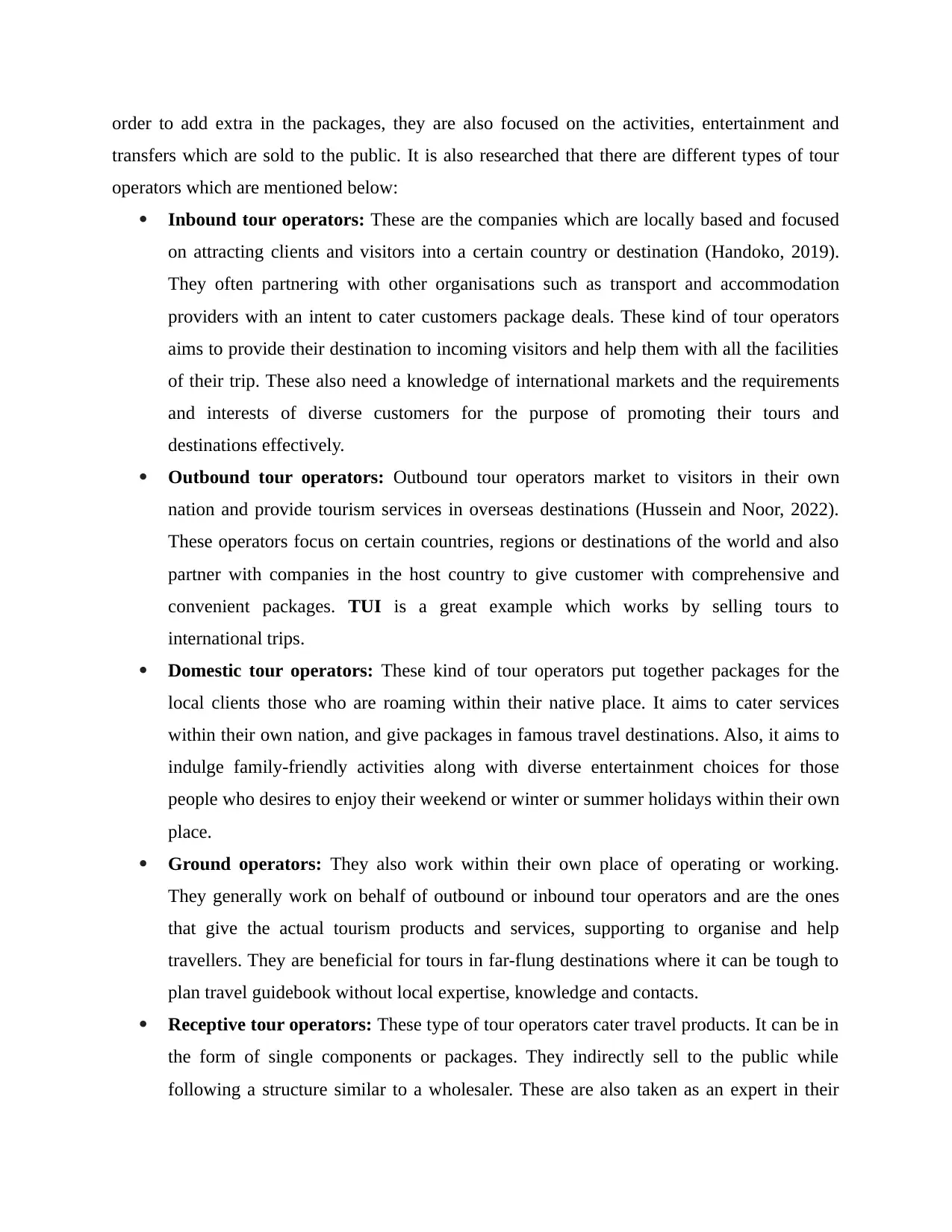
order to add extra in the packages, they are also focused on the activities, entertainment and
transfers which are sold to the public. It is also researched that there are different types of tour
operators which are mentioned below:
Inbound tour operators: These are the companies which are locally based and focused
on attracting clients and visitors into a certain country or destination (Handoko, 2019).
They often partnering with other organisations such as transport and accommodation
providers with an intent to cater customers package deals. These kind of tour operators
aims to provide their destination to incoming visitors and help them with all the facilities
of their trip. These also need a knowledge of international markets and the requirements
and interests of diverse customers for the purpose of promoting their tours and
destinations effectively.
Outbound tour operators: Outbound tour operators market to visitors in their own
nation and provide tourism services in overseas destinations (Hussein and Noor, 2022).
These operators focus on certain countries, regions or destinations of the world and also
partner with companies in the host country to give customer with comprehensive and
convenient packages. TUI is a great example which works by selling tours to
international trips.
Domestic tour operators: These kind of tour operators put together packages for the
local clients those who are roaming within their native place. It aims to cater services
within their own nation, and give packages in famous travel destinations. Also, it aims to
indulge family-friendly activities along with diverse entertainment choices for those
people who desires to enjoy their weekend or winter or summer holidays within their own
place.
Ground operators: They also work within their own place of operating or working.
They generally work on behalf of outbound or inbound tour operators and are the ones
that give the actual tourism products and services, supporting to organise and help
travellers. They are beneficial for tours in far-flung destinations where it can be tough to
plan travel guidebook without local expertise, knowledge and contacts.
Receptive tour operators: These type of tour operators cater travel products. It can be in
the form of single components or packages. They indirectly sell to the public while
following a structure similar to a wholesaler. These are also taken as an expert in their
transfers which are sold to the public. It is also researched that there are different types of tour
operators which are mentioned below:
Inbound tour operators: These are the companies which are locally based and focused
on attracting clients and visitors into a certain country or destination (Handoko, 2019).
They often partnering with other organisations such as transport and accommodation
providers with an intent to cater customers package deals. These kind of tour operators
aims to provide their destination to incoming visitors and help them with all the facilities
of their trip. These also need a knowledge of international markets and the requirements
and interests of diverse customers for the purpose of promoting their tours and
destinations effectively.
Outbound tour operators: Outbound tour operators market to visitors in their own
nation and provide tourism services in overseas destinations (Hussein and Noor, 2022).
These operators focus on certain countries, regions or destinations of the world and also
partner with companies in the host country to give customer with comprehensive and
convenient packages. TUI is a great example which works by selling tours to
international trips.
Domestic tour operators: These kind of tour operators put together packages for the
local clients those who are roaming within their native place. It aims to cater services
within their own nation, and give packages in famous travel destinations. Also, it aims to
indulge family-friendly activities along with diverse entertainment choices for those
people who desires to enjoy their weekend or winter or summer holidays within their own
place.
Ground operators: They also work within their own place of operating or working.
They generally work on behalf of outbound or inbound tour operators and are the ones
that give the actual tourism products and services, supporting to organise and help
travellers. They are beneficial for tours in far-flung destinations where it can be tough to
plan travel guidebook without local expertise, knowledge and contacts.
Receptive tour operators: These type of tour operators cater travel products. It can be in
the form of single components or packages. They indirectly sell to the public while
following a structure similar to a wholesaler. These are also taken as an expert in their
⊘ This is a preview!⊘
Do you want full access?
Subscribe today to unlock all pages.

Trusted by 1+ million students worldwide
1 out of 68
Related Documents
Your All-in-One AI-Powered Toolkit for Academic Success.
+13062052269
info@desklib.com
Available 24*7 on WhatsApp / Email
![[object Object]](/_next/static/media/star-bottom.7253800d.svg)
Unlock your academic potential
Copyright © 2020–2026 A2Z Services. All Rights Reserved. Developed and managed by ZUCOL.





